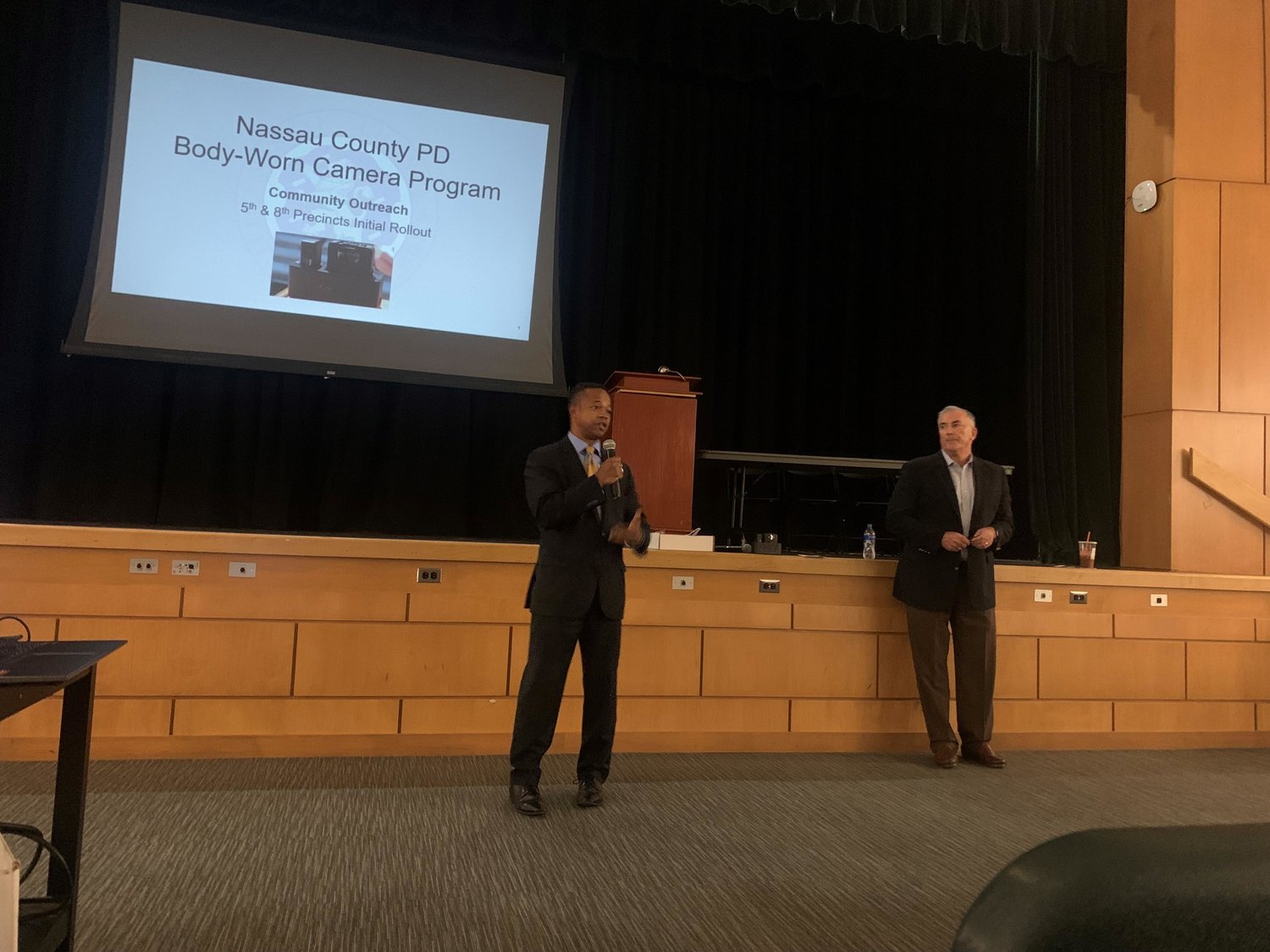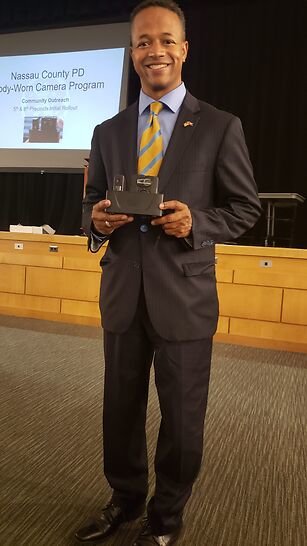Body camera program coming to Elmont this fall
The body camera program set to be rolled out by the Nassau County Police Department across the county by the end of the year, and in Elmont beginning in September, was detailed at a community meeting at Elmont Memorial Junior-Senior High School on July 20. County Legislator Carrié Solages and former State Legislator Michael Balboni gave a presentation on the program, and representatives of the NCPD fielded community members’ questions.
The program will be introduced first in the NCPD’s 8th Precinct and the Elmont-Lakeview portion of the 5th Precinct. The trial stage was initially targeted exclusively at the 8th Precinct, but Legislator Siela Bynoe, who represents the county’s 2nd Legislative District, reached out to the NCPD to push for testing in communities, including Elmont, that were among the first to call for the program.
“The fact that they changed their decision and decided to expand the program shows that this, liken our Constitution, is a living document that will evolve,” Solages said, adding that the decision to test the program in Elmont demonstrated a flexible approach. “We say one thing in the beginning, but if we learn better steps and better ways to improve the program, we will do so,” he said.
Balboni, a former assemblyman and senator who represented Elmont for nearly 20 years in Albany, said that community input was a major goal of the body camera program. “Transparency and improved policing help to build trust between police and the communities they serve,” the slides of the presentation noted, emphasizing that body camera recordings can hold police officers accountable as well as provide evidence from their point of view.
“We all know that this is a solution for us, the community, and professionals to come together and move forward,” Solages said at the start of the meeting, alluding to the schism across the U.S. between advocates for police officers and social- and racial-justice activists. The presentation also acknowledged the nationwide call for improved policing that was reinvigorated by the killing of George Floyd and the Black Lives Matter movement, and emphasized that the public’s demands have been heard in Nassau County.
“The cameras are designed to provide a record of interactions between police officers and members of the public,” a flier released by Solages’s office states, “and [to] be used by the Nassau County District Attorney’s Office for discovery purposes in criminal cases and by the police department to review complaints against officers.”
An NCPD policy on the cameras, now in the works, will detail when officers must record, how they will securely manage and upload camera data and how they will troubleshoot malfunctioning hardware. “Once trained, patrol officers and supervisors will be assigned their own bodyworn camera for use only in accordance with department policy and the law,” according to the slides presented by Solages and Balboni. The NCPD policy will require camera activation during four specific police-public interactions: responding to calls for service, traffic stops, enforcement actions such as the serving of warrants, and transporting people.
“NCPD’s planned body-worn camera rollout reflects the experience of police departments nationwide and locally, including the Freeport P.D., New York State Police and NYPD,” according to Solages and Balboni. In addition, the NCPD body camera program incorporates recommendations from the Department of Justice’s Community Oriented Policing Services, Major Cities Chiefs Association, International Association of Chiefs of Police and the Police Executive Research Forum.
NCPD supervisors will be trained first, and they will train officers, who will be subject to extensive retraining, and disciplinary action, if they fail to follow NCPD policy, Balboni said.
Balboni, who displayed a body camera and demonstrated how officers will wear them, stressed that the program would bolster a sense of safety and trust between the public and officers, and enhance both officer accountability and performance. “The officers will learn from the videos produced by the body cameras,” he said.
“Before we reach disciplinary [action], there will be formalized training that will be provided to the Police Department, and then the Police Department will provide to our officers,” said James Sherry, senior vice president at RedLand Strategies, a consulting firm that specializes in homeland security and helped plan the presentation given by Solages and Balboni. In response to a question about how officers who do not comply with the program’s rules would be disciplined. He added that officers would undergo multi-hour training courses. In addition, NCPD supervisors will be required to view a percentage of body-cam film randomly to ensure that officers are abiding by policy.
The body cameras were designed by Getac, a computing company whose products have been used by the U.S. Air Force and the Israel Police, and Island Tech Services, a Ronkonkoma-based IT Services company that creates technologies for organizations in the public-safety and emergency-response sectors. The “cutting-edge modernizations” of the cams,” Solages added, are designed to ensure the safety of both police officers and residents.
“Here, at least in my district, we don’t believe in defunding the police,” Solages said. “We believe in getting all of our agencies the adequate resources they need to get the job done.”
“A lot of this has been accomplished in other jurisdictions,” Sherry said, “and those good lessons, those good practices are being baked into the plans in Nassau County.”

 50.0°,
Overcast
50.0°,
Overcast 







